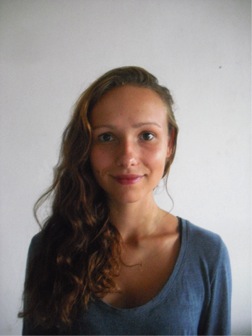
Mareike Smolka (website)
I am a PhD student in Science & Technology Studies (STS) at Maastricht University in the Netherlands. My PhD project is a qualitative study of ethics and different conceptions of ‘responsibility’ in (neuro)scientific research on Buddhist meditation. I insert myself as a participant in various sites: in a large-scale European clinical trial where I study ethics on the laboratory floor, in a religious study scholarly community in which I follow negotiations concerning scientific approaches to the study of religious practices, in conferences on mindfulness and meditation to trace emerging research trends, and in the middle of a meditation community to understand meditators’ ethical positioning.
The IMC is great place both to meet a variety of inspiring scholars and scientists, but also to advance in reading and writing. The centre is flooded with light since the office spaces are separated by glass walls which creates a pleasant working atmosphere and renders colleagues approachable who are usually very open for having a chat and exchanging ideas. I scheduled meetings with researchers not only from IMC but from Aarhus University more broadly whose work sparked my interest and who I asked for advice. Meeting anthropologist and STS researcher Joseph Dumit, also a visiting scholar at IMC at the time, was a highlight during my stay. I am also very grateful to Katrin Heinemann who introduced me to micro-phenomenology in several sessions and opened up new research ideas. In addition, I appreciated the opportunities to present my work at the Centre for STS-studies and to give a workshop at IMC on Socio-Technical Integration Research, a method that I employed for laboratory fieldwork.
Visiting the IMC gave me an insight into how interdisciplinary centres facilitate collaborations. This is relevant for my own research since I have reflected upon, experimented and struggled with interdisciplinarity across the humanities-neuroscience-divide for some time. Moreover, receiving support and advice from Andreas Roepstorff for a grant application that I am currently working on has been invaluable for advancing my research. Finally, opportunities for future collaborations emerged. I found contributors for a conference panel, the possibility to conduct additional interviews for my PhD research opened up, and I am thinking about working together on a study with a researcher from IMC. Hence, I am currently trying to figure out how to return to IMC as soon as possible.
I visited the IMC for the month of August. This means that the centre was starting up again after the summer holidays and that less events were scheduled than during the semester. Depending on the purpose of your stay, you may choose a busier period when more seminars and workshops are taking place. I would recommend signing up for the IMC newsletter to stay informed about what is happening and to check out the university and department websites. The weekly Thursday breakfasts and lunch breaks are also a good opportunity to meet and greet. However, time goes by way too quickly anyways, especially if you schedule meetings with researchers while you are at IMC and if you seek out opportunities for presenting your work, not only at IMC but also at other departments. In general, the centre is relatively busy in the morning and midday – a good time to meet people. In the afternoon, it gets quieter so as to get some individual work done. As it is possible to access the university and the IMC at all times, you can plan your time flexibly.